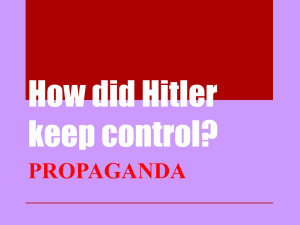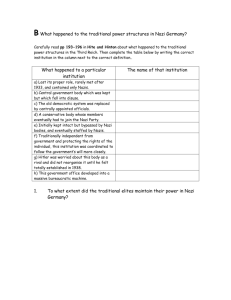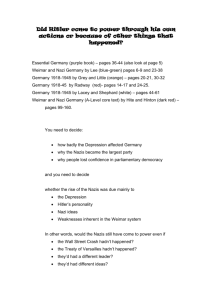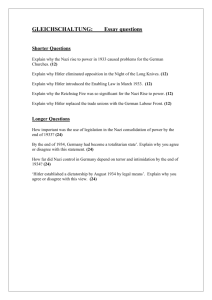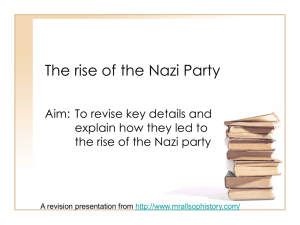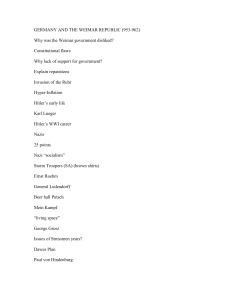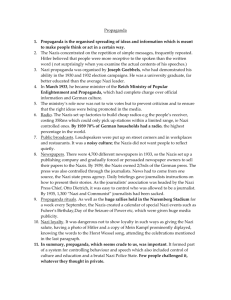Nazi Propaganda and Censorship
advertisement
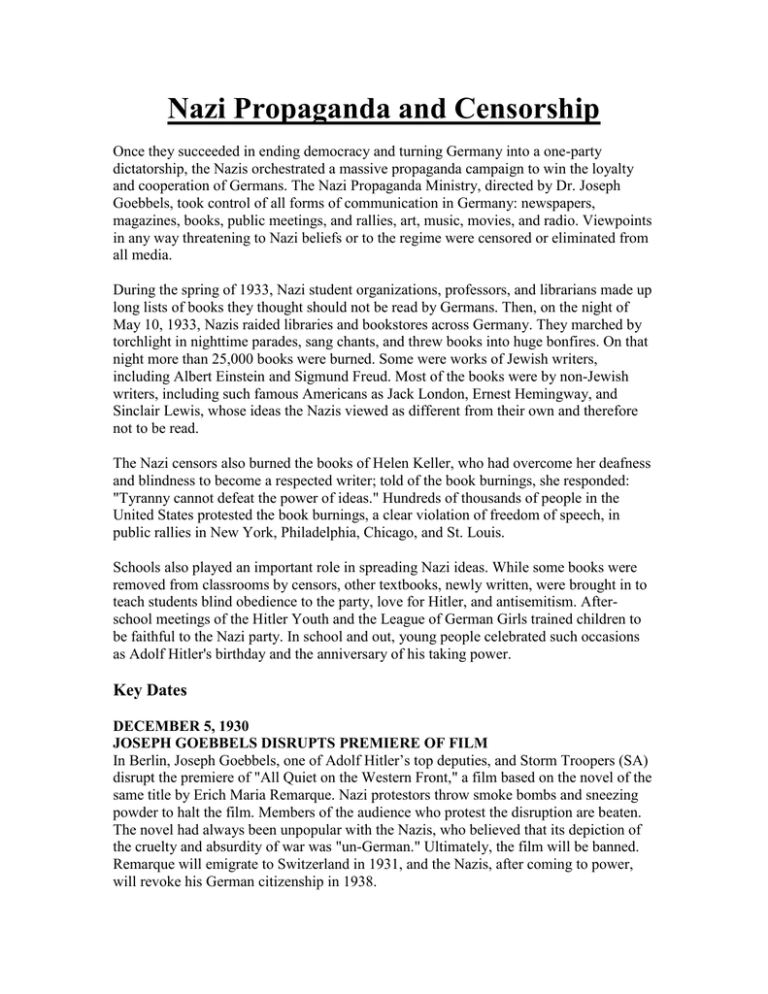
Nazi Propaganda and Censorship Once they succeeded in ending democracy and turning Germany into a one-party dictatorship, the Nazis orchestrated a massive propaganda campaign to win the loyalty and cooperation of Germans. The Nazi Propaganda Ministry, directed by Dr. Joseph Goebbels, took control of all forms of communication in Germany: newspapers, magazines, books, public meetings, and rallies, art, music, movies, and radio. Viewpoints in any way threatening to Nazi beliefs or to the regime were censored or eliminated from all media. During the spring of 1933, Nazi student organizations, professors, and librarians made up long lists of books they thought should not be read by Germans. Then, on the night of May 10, 1933, Nazis raided libraries and bookstores across Germany. They marched by torchlight in nighttime parades, sang chants, and threw books into huge bonfires. On that night more than 25,000 books were burned. Some were works of Jewish writers, including Albert Einstein and Sigmund Freud. Most of the books were by non-Jewish writers, including such famous Americans as Jack London, Ernest Hemingway, and Sinclair Lewis, whose ideas the Nazis viewed as different from their own and therefore not to be read. The Nazi censors also burned the books of Helen Keller, who had overcome her deafness and blindness to become a respected writer; told of the book burnings, she responded: "Tyranny cannot defeat the power of ideas." Hundreds of thousands of people in the United States protested the book burnings, a clear violation of freedom of speech, in public rallies in New York, Philadelphia, Chicago, and St. Louis. Schools also played an important role in spreading Nazi ideas. While some books were removed from classrooms by censors, other textbooks, newly written, were brought in to teach students blind obedience to the party, love for Hitler, and antisemitism. Afterschool meetings of the Hitler Youth and the League of German Girls trained children to be faithful to the Nazi party. In school and out, young people celebrated such occasions as Adolf Hitler's birthday and the anniversary of his taking power. Key Dates DECEMBER 5, 1930 JOSEPH GOEBBELS DISRUPTS PREMIERE OF FILM In Berlin, Joseph Goebbels, one of Adolf Hitler’s top deputies, and Storm Troopers (SA) disrupt the premiere of "All Quiet on the Western Front," a film based on the novel of the same title by Erich Maria Remarque. Nazi protestors throw smoke bombs and sneezing powder to halt the film. Members of the audience who protest the disruption are beaten. The novel had always been unpopular with the Nazis, who believed that its depiction of the cruelty and absurdity of war was "un-German." Ultimately, the film will be banned. Remarque will emigrate to Switzerland in 1931, and the Nazis, after coming to power, will revoke his German citizenship in 1938. MARCH 13, 1933 JOSEPH GOEBBELS HEADS REICH PROPAGANDA MINISTRY Joseph Goebbels, one of Adolf Hitler's most trusted associates, is appointed to head the Reich Ministry for Popular Enlightenment and Propaganda. This agency controls the writing and broadcast of all media (newspapers, radio programs, and movies) as well as public entertainment and cultural programs (theater, art, and music). Goebbels integrates Nazi racism and ideas into the media. MAY 10, 1933 JOSEPH GOEBBELS SPEAKS AT BOOK BURNING IN BERLIN Forty thousand people gather to hear German propaganda minister Joseph Goebbels speak in Berlin's Opera Square. Goebbels condemns works written by Jews, liberals, leftists, pacifists, foreigners, and others as "un-German." Nazi students begin burning books. Libraries across Germany are purged of "censored" books. Goebbels proclaims the "cleansing of the German spirit." -United States Holocaust Memorial Museum
